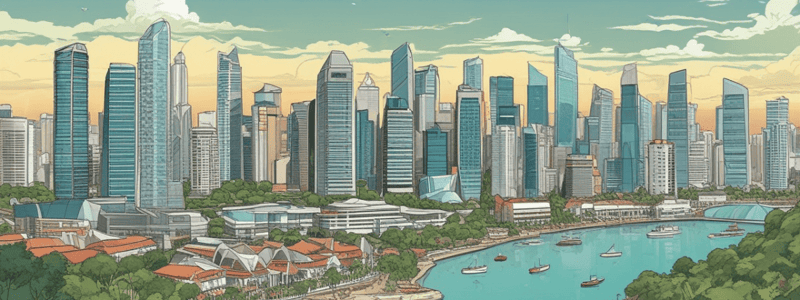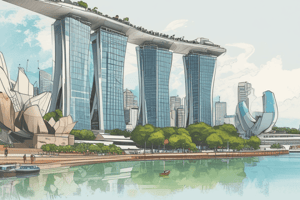Podcast
Questions and Answers
What is the approximate total area of Singapore?
What is the approximate total area of Singapore?
- 1500 sq km
- 1000 sq km
- 720 sq km (correct)
- 500 sq km
What is the highest point in Singapore?
What is the highest point in Singapore?
- Sentosa Island (300m)
- Bukit Timah Hill (164m) (correct)
- Mount Faber (250m)
- Bukit Timah Hill (100m)
What is the dominant ethnicity in Singapore?
What is the dominant ethnicity in Singapore?
- Malays
- Indians
- Chinese (correct)
- Eurasians
What was Singapore's status during World War II?
What was Singapore's status during World War II?
When did Singapore gain independence from Malaysia?
When did Singapore gain independence from Malaysia?
What is the main type of economy in Singapore?
What is the main type of economy in Singapore?
What is the head of government in Singapore?
What is the head of government in Singapore?
What is a popular dish in Singapore?
What is a popular dish in Singapore?
Study Notes
Geography and Climate
- Location: Southeast Asia, between Malaysia and Indonesia
- Island city-state, comprising 63 islands
- Total area: approximately 720 sq km
- Highest point: Bukit Timah Hill (164m)
- Tropical rainforest climate, with high temperatures and humidity throughout the year
Demographics
- Population: approximately 5.69 million (2020)
- Ethnic groups: Chinese (76.2%), Malays (12.2%), Indians (3.2%), Eurasians and others (8.4%)
- Languages: English (official), Malay, Mandarin Chinese, Tamil, and other languages
- Religions: Buddhism (34.6%), Islam (14.3%), Christianity (18.3%), Taoism (10.3%), Hinduism (5.4%), and others
History
- Founded in 1819 by Sir Stamford Raffles as a British trading colony
- Became a crown colony in 1867
- Occupied by Japan during World War II (1942-1945)
- Self-government in 1959, merger with Malaysia in 1963
- Independence from Malaysia in 1965, with Lee Kuan Yew as the first Prime Minister
Economy
- Highly developed free market economy
- One of the Four Asian Tigers, known for rapid industrialization and economic growth
- Key industries: finance, manufacturing, tourism, and logistics
- Strong trade relationships with countries around the world
Government and Politics
- Parliamentary republic, with a President as head of state and a Prime Minister as head of government
- One-party dominant system, with the People's Action Party (PAP) in power since 1959
- Divided into 5 regions, each with its own Mayor and Council
Culture
- Multicultural society, with a blend of Asian and Western influences
- Cuisine: Chinese, Malay, Indian, and Western food, with popular dishes like chili crab and Hainanese chicken rice
- Festivals: Chinese New Year, Hari Raya Puasa, Deepavali, and Christmas
- Arts: vibrant scene, with museums, galleries, and performance venues
Geography and Climate
- Singapore is located in Southeast Asia, between Malaysia and Indonesia
- It is an island city-state comprising 63 islands
- The total area of Singapore is approximately 720 sq km
- The highest point in Singapore is Bukit Timah Hill, which stands at 164m
- The country has a tropical rainforest climate with high temperatures and humidity throughout the year
Demographics
- As of 2020, the population of Singapore is approximately 5.69 million
- The ethnic groups in Singapore are Chinese (76.2%), Malays (12.2%), Indians (3.2%), and Eurasians and others (8.4%)
- The official language of Singapore is English, but other languages spoken include Malay, Mandarin Chinese, Tamil, and others
- The main religions in Singapore are Buddhism (34.6%), Islam (14.3%), Christianity (18.3%), Taoism (10.3%), Hinduism (5.4%), and others
History
- Singapore was founded in 1819 by Sir Stamford Raffles as a British trading colony
- It became a crown colony in 1867 and was occupied by Japan during World War II (1942-1945)
- Singapore gained self-government in 1959 and merged with Malaysia in 1963
- It gained independence from Malaysia in 1965, with Lee Kuan Yew as the first Prime Minister
Economy
- Singapore has a highly developed free market economy
- It is one of the Four Asian Tigers, known for rapid industrialization and economic growth
- The key industries in Singapore are finance, manufacturing, tourism, and logistics
- The country has strong trade relationships with countries around the world
Government and Politics
- Singapore is a parliamentary republic, with a President as head of state and a Prime Minister as head of government
- The country has a one-party dominant system, with the People's Action Party (PAP) in power since 1959
- Singapore is divided into 5 regions, each with its own Mayor and Council
Culture
- Singapore is a multicultural society with a blend of Asian and Western influences
- The cuisine in Singapore is a mix of Chinese, Malay, Indian, and Western food, with popular dishes like chili crab and Hainanese chicken rice
- The country celebrates various festivals, including Chinese New Year, Hari Raya Puasa, Deepavali, and Christmas
- Singapore has a vibrant arts scene, with museums, galleries, and performance venues
Studying That Suits You
Use AI to generate personalized quizzes and flashcards to suit your learning preferences.
Description
Learn about the location, climate, demographics, and population of Singapore, a southeast Asian island city-state.





